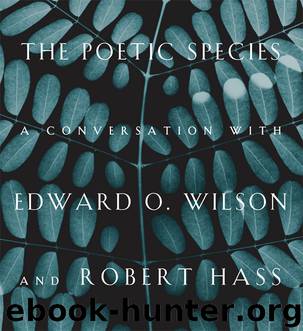The Poetic Species by Edward Wilson Robert Hass Lee Briccetti

Author:Edward Wilson, Robert Hass, Lee Briccetti [Wilson, Edward O; Hass, Robert; Briccetti, Lee]
Language: eng
Format: epub
ISBN: 9781934137734
Publisher: Bellevue Literary Press
APPENDIX
A short list of great classic literary works of science or nature writing and what these books in particular reveal about our evolving attitudes toward science
Robert Hass:
You know, I’d start near the beginning. Ptolemy’s Almagest, Euclid’s Elements. I had an odd education that involved a certain amount of the history of mathematics, so I would add the Conics of Apollonius to the list and Descartes’s Geometry. For literary wonders, there’s Pliny’s Natural History, Lucretius’s amazing poem, De Rerum Natura. A shorthand approach is a wonderful book edited some years ago by a classical scholar, Robert Torrance, entitled Encompassing Nature. It hits a lot of the high notes and is a feast.
And then the letters of Galileo and Origin of Species.
And then the American nature writing tradition. I suppose everyone would start with William Bartram’s Travels and with Walden. And later on in the list (ignoring the prescription) would come, among others, Edward Wilson’s Naturalist (especially interesting—to an outsider—for what a career in science is like) and his Biophilia.
And randomly, from the English natural history tradition, I love J. A. Baker’s The Peregrine and, from Europe and the nineteenth century, Jean-Henri Farbre on spiders. Which makes me think to add Czeslaw Milosz’s great poem, “From the Rising of the Sun,” for the section “Diary of a Naturalist,” which may be the twentieth century’s most definitive expression of revulsion at the cruelty of the food chain.
Edward O. Wilson:
It’s not a good idea to ask a scientist what he has read as literature, and it’s a rare scientist who has wide experience in this creative art. (I’m not one of them who also reads widely in literature for its own sake.) But here are a couple anyway:
Darwin’s four great books (Voyage of the Beagle, The Origin of Species, The Descent of Man, and The Expression of Emotions in Man and Animals), each classic, seminal in its field, and beautifully written.
Erwin Schrödinger’s What Is Life?, proposing a connection between physics and genetics, stirred me as a teenager before the dawn of molecular biology.
Kingdom of Ants: José Celestino Mutis and The Dawn of Natural History in the New World, which I composed with the Spanish scholar José M. Gómez Durán. I mention it here not because we wrote it or it has special literary merit, but because Mutis, the great priest and polymath (1732–1808), initiated scientific natural history in the New World independently of William Bartram. The book he wrote, which would secure his place in history, was lost. Over two centuries later, Gómez Durán and I wrote his book again, using his notes and correspondence newly discovered in Spain. This resurrection is the first account of Mutis’s research in either Spanish or English, a major addition to the history of scientific reporting, and I think it worthy to cite here.
Download
This site does not store any files on its server. We only index and link to content provided by other sites. Please contact the content providers to delete copyright contents if any and email us, we'll remove relevant links or contents immediately.
Enlightenment Now: The Case for Reason, Science, Humanism, and Progress by Steven Pinker(7294)
A Journey Through Charms and Defence Against the Dark Arts (Harry Potter: A Journey Through…) by Pottermore Publishing(4795)
The Immortal Life of Henrietta Lacks by Rebecca Skloot(4567)
A Journey Through Divination and Astronomy by Publishing Pottermore(4371)
Elon Musk by Ashlee Vance(4111)
Origin Story: A Big History of Everything by David Christian(3679)
COSMOS by Carl Sagan(3611)
Alchemy and Alchemists by C. J. S. Thompson(3505)
Bad Pharma by Ben Goldacre(3414)
Enlightenment Now by Steven Pinker(3360)
Shadow of Night by Deborah Harkness(3344)
Inferior by Angela Saini(3302)
A Mind For Numbers: How to Excel at Math and Science (Even If You Flunked Algebra) by Barbara Oakley(3289)
Origin Story by David Christian(3188)
The Code Book by Simon Singh(3163)
Signature in the Cell: DNA and the Evidence for Intelligent Design by Stephen C. Meyer(3118)
The Elements by Theodore Gray(3042)
A Brief History of Time by Stephen Hawking(3011)
A Journey Through Potions and Herbology (A Journey Through…) by Pottermore Publishing(2843)
